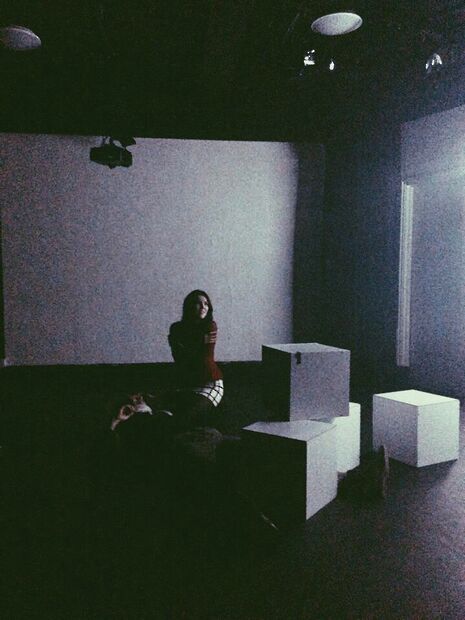war war brand war
Ciaran Chillingworth on why, despite its flaws, this play is still a worthwhile piece of student writing

The biggest compliment that can be payed to war war brand war, Thom May’s new Other Prize winning play, is that, at times, it manages to feel like a better play than the limited resources of student theatre can do justice. It is certainly formally ambitious: the plot, a wide-ranging examination of the outbreak of war and its effects on politicians, journalists and advertising executives, is played out between two large screens on to which is projected a collage of adverts, political rallies, natural phenomena, and clips from a "Virtual Cultural Awareness Trainer". The last of these is a particularly interesting find, following a simulated soldier learning to speak politely with Afghani and Arabic civilians, a bewildering and sinister example of the kinds of well-meaning, dehumanizing attempts of a media-crazed society to make its foreign representatives sensitive to international customs.
I wonder, however, whether this is appropriate to the Corpus Playroom, which entrants to The Other Prize know will be their first performance space. The play feels like it’s going for claustrophobia, generated by rapid-fire advert-, journo- and politics-speak, disorientating film clips, short scenes and unsettling, bass-heavy music, but this is ill-suited to the smallness of the Playroom: it needs a space big enough to make the audience feel small — "overwhelmed" as the play tells us — whereas, at present, it looks like a big thing shrunk down, which is hardly as intimidating. Again, this is a half-compliment to May, and it’s no one’s fault that Cambridge venues are necessarily limited, but it seems like something that should have been considered. Even just moving to the ADC would have made a big difference, although far be it from me to suggest a break with tradition.
May evidently has a good ear for the alienating chaos of modern speech. One of the most effective scenes is, pleasingly, the opening: two advertising executives (Rebecca Cusack and Rebecca Thomas) pitch a bizarre commercial for — what? A car? A perfume? I don’t think anyone could tell, which is good and appropriate, since many modern adverts are so impenetrable that the product would go completely unknown if it wasn’t spelled out in bold letters at the end. The executives gabble out their lines, full of distorted and disorientating images, while their boss (Will Ashford), his back to the audience, nods and offers occasional interjections. It was pleasing to see some creative doubling, which many student productions even of traditional plays shy away from, with Thomas and Ashford taking on three roles each, drawing neat connections between the worlds of advertising, televised news and film.
There are, however, some problems which I suspect cannot be blamed on limited resources. For starters, the play is far too short, coming in at about fifty minutes by my watch – it cuts off without much of an ending, just as the characters are starting to make sense. Perhaps this is May’s intention, but, if so, it isn’t very well executed. The play’s claim to be an "adaptation" of the Oresteia, seems to me to be bigger than what is actually delivered. Beyond the family drama, some references to torches and search lights, and an odd recognition scene between father and daughter, there doesn’t seem to be enough of Aeschylus to make it an adaptation. The acting is, however, on the whole good, and the cast does well with what is obviously a challenging script. It is an interesting production of an interesting new play, and, although neither is entirely successful, it is worth seeing as a piece of student writing.
 News / SU reluctantly registers controversial women’s soc18 December 2025
News / SU reluctantly registers controversial women’s soc18 December 2025 Features / Should I stay or should I go? Cambridge students and alumni reflect on how their memories stay with them15 December 2025
Features / Should I stay or should I go? Cambridge students and alumni reflect on how their memories stay with them15 December 2025 News / Dons warn PM about Vet School closure16 December 2025
News / Dons warn PM about Vet School closure16 December 2025 News / Cambridge study finds students learn better with notes than AI13 December 2025
News / Cambridge study finds students learn better with notes than AI13 December 2025 News / Uni registers controversial new women’s society28 November 2025
News / Uni registers controversial new women’s society28 November 2025









